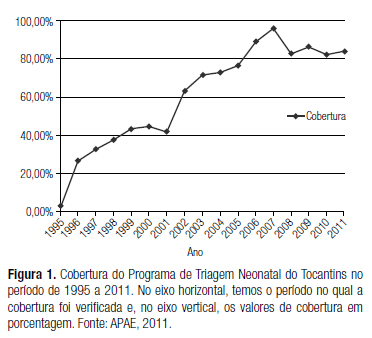OBJECTIVE: To evaluate the Neonatal Screening Program in the State of Tocantins from 1995 to 2011. MATERIALS AND METHODS: Data collection was conducted by means of interviews with those responsible for the service, by the analysis of medical records of patients diagnosed with phenylketonuria (PKU) and congenital hypothyroidism (CH) that were enrolled in the program, and by interviews with parents and/or guardians of the patients monitored. RESULTS: Program coverage increased from 32.3% to 76.6% after the implementation of the National Newborn Screening Program (PNTN). The prevalence of PKU and CH was 1:28,309 and 1:4,632 live births, respectively. The mean ages at the collection of the first blood sample (PKU: 9.6 ± 6.3 days; CH: 13.3 ± 10.3 days) and at the beginning of the treatment (PKU: 57.0 ± 17.6 days; CH: 95,6 ± 57.6 days) were greater than recommended by the Ministry of Health. The quality of monitoring was considered satisfactory by 100% of the parents. CONCLUSION: Although there have been great developments in neonatal screening program in this state, there is need for greater government incentives to optimize the program and to make the PNTN advance to its next phases.
Evaluation of health services; phenylketonuria; congenital hypothyroidism


